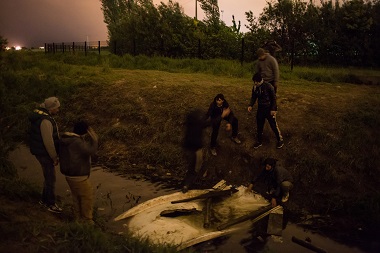“Neither safe nor sound”: Sexual exploitation, trafficking and abuse engulfing the lives of children in the camps of Calais and Dunkirk
Children experience sexual exploitation, violence and forced labour on a daily basis in the camps of Northern France, according to the findings of Neither Safe Nor Sound, a new UNICEF France and UNICEF UK study.

A Taliban uncle threatened to use Sufyan, 15, in a suicide attack. He escaped to Europe and has been in Calais for 8 or 9 months, trying to cross into England.
The study looked at 60 children between the ages of 11-17 – from Afghanistan, Egypt, Eritrea, Ethiopia, Iran, Iraq, Kuwait, Syria, and Vietnam – living in seven camps along the coast of the English Channel between January and April 2016.
The children’s testimonies paint a picture of abuse and tragedy, with cases of debt slavery and forced criminal activity, such as assisting smugglers at ferry terminals.
Sexual violence is a constant threat, including the sexual exploitation and rape of boys, and rape and forced prostitution of girls. Interviews with young women identified practices of exchanging sexual services for the promise of passage to the UK or to speed up their journey.
Many of these children have fled conflict and are now trapped in the camps, some desperately close to reaching family already living in the UK where a bed is waiting for them.
In most of the camps an "entry fee" is levied by the traffickers before the minors are allowed to stay there. The unaccompanied children who are unable to pay find themselves forced to agree to perform laborious tasks for the adults, such as selling food at the informal night-time market which operates in the so-called Calais Jungle.
Complaints of cold and fatigue are commonplace due to the dismal living conditions, with children constantly exposed to the elements.
There is no access to regular schooling despite the fact that this is a mandatory provision.
Some children have expressed their desire to be hospitalised in a psychiatric ward following instances of mental breakdowns and aggressive and violent episodes.
Traffickers are now charging between £4,000 and £5,500 (US$5,600-$7,000) per person to cross the English Channel – a higher price than ever before. And because of the increased security presence this situation has pushed children into the hands of those traffickers, or forced them to take even more significant risks in order to pass through without paying – in some cases by hiding themselves in refrigerated lorries.
Unicef UK Deputy Executive Director Lily Caprani said: “Immediate action by the UK Government could stop children falling into the hands of traffickers and show it’s serious about its recent commitments to refugee children.
“The Prime Minister says unaccompanied children should be brought to the UK if they have family here, yet these children’s cases are moving far too slowly. These camps are no place for a child – we know there are at least 157 children in Calais with the legal right to be with their family in the UK.
“The longer these children have to wait, the more desperate they may become and the more likely they are to risk their lives fleeing the appalling conditions of the camps to reach their families.”
For his part, Director-General of UNICEF France Sebastien Lyon said: “The first priority for all the children who continue to come unaccompanied into France is the creation of unconditional protective spaces, so that the new arrivals will not have to suffer what other children went through in the winter of 2015.”
The report estimates that, as at March 2016, there were 500 unaccompanied children living across the seven sites, including Calais and Dunkirk, and that around 2,000 unaccompanied children have passed through them since June 2015.
Although the average stay in these ‘jungles’ is five months, some children had been there for as long as nine months and one had been there for over a year. However, this average is quickly increasing because of heightened security at the borders and the increased difficulty of making these journeys. By staying in these camps longer, children are subjected to more and more dangers.
The protection of unaccompanied children is a state obligation, as laid out in the Convention on the Rights of the Child. But response is fragmented and often the process does not have the best interests of these children at heart.
Also published this week was UNICEF’s Child Alert on refugee and migrant children’s harrowing journeys to Europe. Some 4,760 children were among the almost 28,000 people who made the perilous crossing from North Africa to Italy in the first four months of 2016. Of those children, 94 per cent were unaccompanied.
Source: United Nations Children's Fund
- 238 reads
Human Rights
Ringing FOWPAL’s Peace Bell for the World:Nobel Peace Prize Laureates’ Visions and Actions

Protecting the World’s Cultural Diversity for a Sustainable Future

The Peace Bell Resonates at the 27th Eurasian Economic Summit

Declaration of World Day of the Power of Hope Endorsed by People in 158 Nations

Puppet Show I International Friendship Day 2020

